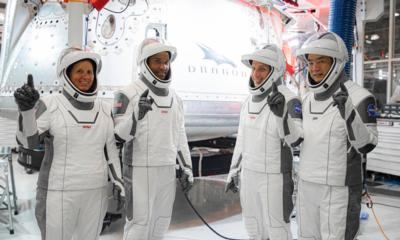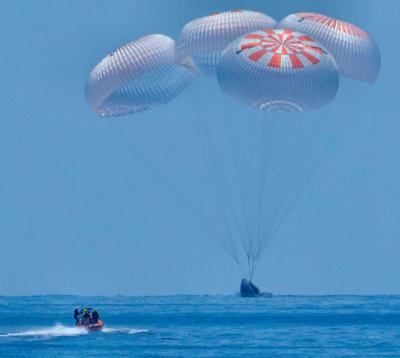In 2020, The FAA Licensed 41 Commercial Space Operations
The FAA is crowing about a record number of launches, new streamlined launch and reentry licensing regulations, and a historic licensed crewed mission are some of the noteworthy commercial space transportation achievements of the Federal Aviation Administration (FAA) in 2020. The FAA will 'build on these accomplishments in the coming year.'

“This record-setting year in launches, and the new streamlined launch and reentry licensing regulations, bode well for continued rapid growth of America’s commercial space sector,” said U.S. Transportation Secretary Elaine L. Chao.
In 2020, the FAA licensed 41 commercial space operations (launches and reentries), the most in the agency’s history. Those operations included a record 39 FAA-licensed launches, including the first-ever NASA crewed mission to be licensed by the FAA. For 2021, the FAA is forecasting the number of licensed operations could reach 50 or more.
“The FAA is well positioned to keep pace with the dramatic increase in commercial space operations and support the innovation driven by the aerospace industry while keeping public safety a top priority,” said FAA Administrator Steve Dickson.
Contributing to this year’s accomplishments are the benefits of a recent reorganization of the FAA Office of Commercial Space Transportation. The changes increased the efficiency, effectiveness and accountability of the office, allowing it to dynamically scale its processes to meet the burgeoning private sector licensing demand.

The organizational changes will help the FAA implement a new rule that modernizes how the agency regulates and licenses commercial space launch and reentry operations. The rule consolidates multiple regulatory parts to create a single licensing regime for all types of launch and reentry operations, replaces prescriptive requirements with performance-based criteria, and allows the aerospace industry to continue to innovate and grow.
In 2021, the FAA will continue to provide policies and guidance to support the streamlined licensing rule by publishing advisory circulars that will identify possible means of compliance. Working with the Commercial Space Transportation Advisory Council (COMSTAC), the FAA also will prioritize its other regulations for updates and streamlining. Additionally, the agency anticipates the private sector will make notable progress toward commercially viable space tourism.
In the coming year, the FAA also will continue to test new technologies to further enable the safe and efficient integration of space-vehicle operations with other types of air traffic in the National Airspace System. Additionally, the FAA will establish an interagency working group to develop a recommended National Spaceport Strategy to advance a robust, innovative national system of spaceports. It will also support the directives and other tasks of America’s National Space Policy.
An FAA license is required to conduct any commercial space launch or reentry, the operation of any launch or reentry site by U.S. citizens anywhere in the world, or by any individual or entity within the United States. Once the FAA issues a license or permit, the agency works with operators to make sure they are meeting the requirements to conduct launches and reentries. This includes having FAA safety inspectors monitor licensed activities.
 ANN's Daily Aero-Term (12.19.25): Ultrahigh Frequency (UHF)
ANN's Daily Aero-Term (12.19.25): Ultrahigh Frequency (UHF) NTSB Prelim: Cirrus Design Corp SR22T
NTSB Prelim: Cirrus Design Corp SR22T Classic Aero-TV: The Red Tail Project--Carrying the Torch of the Tuskegee Airmen
Classic Aero-TV: The Red Tail Project--Carrying the Torch of the Tuskegee Airmen Aero-News: Quote of the Day (12.19.25)
Aero-News: Quote of the Day (12.19.25) Airborne 12.17.25: Skydiver Hooks Tail, Cooper Rotax Mount, NTSB v NDAA
Airborne 12.17.25: Skydiver Hooks Tail, Cooper Rotax Mount, NTSB v NDAA




